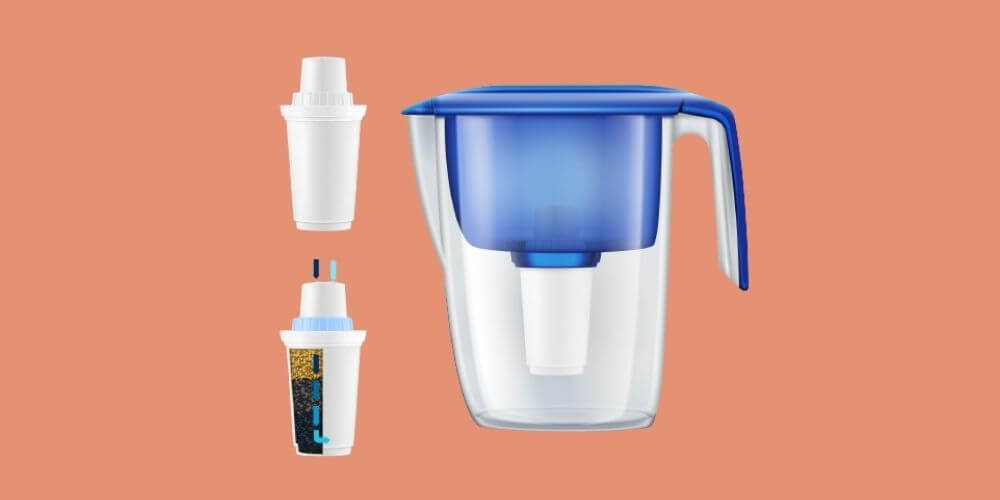When it comes to choosing a water filter, there are many options available. But which one is best for you? Zero water or Brita?

Not only does filtering your water make it taste better, but it can also help improve your overall health.
There are a number of different water filters on the market, so how do you know which one is best for you? In this post, we’ll compare zero water vs Brita and help you decide which one is right for you. Keep reading to learn more!
Zero water vs Brita comparison
Head to head, zero water, and Brita are pretty evenly matched. Both filters can effectively filter your tap water so that it tastes better than just the unfiltered stuff straight from the tap.
With both of these products, you can be confident that what is sitting in your cup is clean, safe for drinking, and free of all impurities
There are some key differences between these two products though, which we’ll discuss further on
Before we compare them side-by-side, however, let’s go over how each one works:
How does a water filter work?
Like most filters, both types use activated carbon as their main filtration mechanism
Activated carbon is a porous form of carbon that’s been treated to increase the surface area and improve its ability to adsorb impurities. As water passes over this material, tiny pores in the surface trap contaminants and help remove them from your drinking water
Both Brita and ZeroWater use activated carbon for their filters, so they’re both pretty similar when it comes to filtration technology
How well do these filters work?
As we mentioned earlier, each one uses activated carbon as its main filtration media, and both can effectively reduce lead levels found in tap water among other things
So far we’ve only compared the two on an even playing field. Now let’s take a look at some key differences between these two products so you have a better idea of which one is right for you.
Brita water filter pitcher vs ZeroWater – 5 main differences to consider
Here are the top five differences between each product:
1. Brita filters out fewer contaminants – While both Brita and ZeroWater use activated carbon as their key filtration media, the types of impurities they’re able to reduce are different
Brita can effectively reduce chlorine taste and odor, but it will not remove other harmful contaminants such as lead or mercury that may be present in your tap water
Meanwhile, ZeroWater pitchers also use activated carbon as their primary filtration mechanism, but this material has been specially treated with ion exchange resins. These resins attract contaminates and then trap them on the surface of the activated carbon. This makes ZeroWater a more effective filter that reduces a wider range of impurities than Brita
2. ZeroWater filters also ionize water – Another difference between these two products is how they treat your filtered water to improve its quality
While Brita uses activated carbon as its main filtration media, it does not alter your tap water in any way. With ZeroWater pitchers, this material both filters and ionizes water as it passes through the filter, thanks to those positively-charged resins present on the activated carbon’s surface
This means that after removing contaminants with the activated charcoal, the resin traps them and holds onto them until you pour your drink. Then, as the water ionizes, these contaminants are released and your drinking water is left clean of impurities.
This process has a few benefits that may make ZeroWater a more suitable choice for you.
3. ZeroWater tastes better – The ionization process improves both taste and odor by eliminating any impurities found in tap water such as chlorine taste and odor.
In addition, the resin on ZeroWater’s activated carbon also traps harmful contaminants like lead or mercury, making your filtered water cleaner than what comes from Brita’s filter.
4. It costs more to use a ZeroWater pitcher – One downside to using a ZeroWater pitcher is that while it lasts about twice as long as a Brita filter does, it costs much more to replace than its competition.
When you do have to change your filter, ZeroWater’s basic filters cost about $13 each, while the comparable $5.99/filter used in Brita pitchers can be replaced twice as much.
This means that over time, the price difference between Brita and ZeroWater may not always be so pronounced.
5. You may find it difficult to acquire replacement filters – If you want a ZeroWater pitcher for yourself or as a gift, they’re fairly easy to find both online and at most stores nearby.
However, if you need replacement filters, you have to ensure that the replacement filter cartridge states it can be used in ZeroWater pitchers, which means you need to pay careful attention when shopping.
If you’re not up for hunting down a cartridge designed specifically for ZeroWater’s pitcher, then your best bet is to purchase online. This way, you have access to both an extensive product line and speedy shipping capabilities.
Does ZeroWater have to be refrigerated?
If you are wondering if ZeroWater has to be refrigerated? Then it is worth noting that this is a question that many people have. The answer is, it depends on how you plan to use the water filter.
If you are only using it for drinking water, then you do not have to refrigerate it.
However, if you are using it for cooking or making baby formula, then you should refrigerate it. Keep in mind that boiling water will kill any bacteria or parasites, so if you are just using ZeroWater for drinking water, there is no need to boil the water first.
Does ZeroWater remove bacteria?
Zero Water filters were tested by the Water Quality Association (WQA) against US EPA requirements and they were found to reduce bacteria, making them an effective water filter that can improve your drinking water
Some health risks associated with bacteria that you should be aware of include E Coli, Salmonella, Vibrio Cholerae, Typhoid fever, and several others
The following are some benefits of drinking filtered water –
- It eliminates chlorine taste & odor.
- Provides fresh tasting water Bacteriostatic (prevents bacterial growth).
- Other impurities like lead or mercury are also reduced.
With this in mind, you should consider why it is important to use a high-quality water filter when you can get a pitcher that is capable of removing bacteria from your drinking.
Final Thoughts
In conclusion, your next logical step is to decide which method works best for you.
If you’re looking for a quick fix in terms of a cost-effective solution, Brita may be right for you. However, if you want the extra assurance of more thorough filtration and superior design, then purchasing a ZeroWater pitcher may be what you need.

